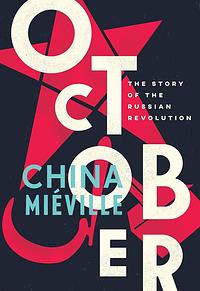You need to sign in or sign up before continuing.
Take a photo of a barcode or cover
adventurous
challenging
informative
medium-paced
October is an engaging and well-written retelling of one of the pivotal events of the 20th century. I definitely recommend it to anyone looking for a basic introduction to what actually happened during the Russian Revolution and who the major players were. Mieville is really good at interspersing the more dry, formulaic parts of the narrative with memorable and atmopsheric anecdotes that bring the historical events to life in the reader's imagination.
That said, there's a lot that I wish Mieville went into more detail on. There are a lot or really interesting characters in this drama that I found myself wanting to know more about. And while he goes into great detail about the Bolshevik-Menshevik split on issues like the war effort and Soviet power, I do wish he'd sometimes gone into a bit more detail about some of the other theoretical debates that were going on.
Beyond being a well-told history lesson, I found Mieville's retelling of the Russian Revolution to be a useful lense for reflecting on the present state of capitalism. One of the central questions he focuses on is that of how to build a revolution when only a small minority of the country is part of the industrial proletariat. For the Mensheviks, the answer is to ensure the sucess of a bourgeois revolution that will develop capital to the point where socialism is possible. For the Bolsheviks, on the other hand, it meant forming a mass coalition with peasants and soldiers in order to take power immediately and (at least in theory) put the nascent proletariat in charge of developing productive forces.
What I find interesting is not so much the subsequent trajectory of the revolution and its ultimate failure, but rather the way in which the late capitalism, with its drive toward automation and de-industrialization, presents us with an inversion of the situation faced by the Russians of 1917. Especially in the first world (but even in the third) the industrial working class forms an increasingly small fraction of the general population, with more and more people being forced instead into service-sector jobs, unemployment, imprisonment, the "gig economy" etc. With the decreasing likelyhood of this shrinking proletariat naturally taking it upon themselves to overthrow capitalism, the Bolshevik approach should once again be of great interest to leftists reckoning with capital in its contemporary form. As Rosa Luxemburg writes in her appraisal of the October Revolution: "The true dialectic of revolutions [...] stands [the] wisdom of parliamentary moles on its head: not through a majority, but through revolutionary tactics to a majority – that’s the way the road runs."
That said, there's a lot that I wish Mieville went into more detail on. There are a lot or really interesting characters in this drama that I found myself wanting to know more about. And while he goes into great detail about the Bolshevik-Menshevik split on issues like the war effort and Soviet power, I do wish he'd sometimes gone into a bit more detail about some of the other theoretical debates that were going on.
Beyond being a well-told history lesson, I found Mieville's retelling of the Russian Revolution to be a useful lense for reflecting on the present state of capitalism. One of the central questions he focuses on is that of how to build a revolution when only a small minority of the country is part of the industrial proletariat. For the Mensheviks, the answer is to ensure the sucess of a bourgeois revolution that will develop capital to the point where socialism is possible. For the Bolsheviks, on the other hand, it meant forming a mass coalition with peasants and soldiers in order to take power immediately and (at least in theory) put the nascent proletariat in charge of developing productive forces.
What I find interesting is not so much the subsequent trajectory of the revolution and its ultimate failure, but rather the way in which the late capitalism, with its drive toward automation and de-industrialization, presents us with an inversion of the situation faced by the Russians of 1917. Especially in the first world (but even in the third) the industrial working class forms an increasingly small fraction of the general population, with more and more people being forced instead into service-sector jobs, unemployment, imprisonment, the "gig economy" etc. With the decreasing likelyhood of this shrinking proletariat naturally taking it upon themselves to overthrow capitalism, the Bolshevik approach should once again be of great interest to leftists reckoning with capital in its contemporary form. As Rosa Luxemburg writes in her appraisal of the October Revolution: "The true dialectic of revolutions [...] stands [the] wisdom of parliamentary moles on its head: not through a majority, but through revolutionary tactics to a majority – that’s the way the road runs."
A thrilling and engaging retelling of the Revolution.
"[Lenin] wonders pugnaciously, however, whether a people ‘influenced by the hopelessness of its situation’ could be blamed for ‘fling[ing] itself into a struggle that would offer it at least some chance of securing conditions for the further development of civilisation that were somewhat unusual’."
the writing was beautiful and i loved how mieville told the story in an almost fictional epic like way rather than a dry history book. it dragged on in some parts and i was desperate to finish it because i got bored and impatient after a while but it was still so interesting. i especially loved the little descriptions of the revolutionaries personalities and how they were described by others (like lenin being angry at the bolsheviks in the train for talking loudly lol)
the writing was beautiful and i loved how mieville told the story in an almost fictional epic like way rather than a dry history book. it dragged on in some parts and i was desperate to finish it because i got bored and impatient after a while but it was still so interesting. i especially loved the little descriptions of the revolutionaries personalities and how they were described by others (like lenin being angry at the bolsheviks in the train for talking loudly lol)
adventurous
challenging
dark
emotional
funny
hopeful
informative
inspiring
reflective
sad
tense
fast-paced
Thorough history of the months leading up to the Russian revolution.
Didn't hold my attention as well as other books on the topic, but I got through it. Refraining from star rating because that may just be a reflection of where my head space and interests are at.
Didn't hold my attention as well as other books on the topic, but I got through it. Refraining from star rating because that may just be a reflection of where my head space and interests are at.
A hard read, but an interesting one.
I now know a great deal more about a time in history that I was completely uninformed about. But so so so many different groups and affiliations and Russian names to remember that at times it just becomes a bit of a blur, much like an actual revolution I assume.
I now know a great deal more about a time in history that I was completely uninformed about. But so so so many different groups and affiliations and Russian names to remember that at times it just becomes a bit of a blur, much like an actual revolution I assume.
I remember being bored by the Russian Revolutions when we did them in second semester Year 12 History back in high school. It seemed like a nonsense conglomeration of fancy-sounding organisations and men, which all kind of blurred one into the other as I spent most of my class time staring (probably drooling) at the girl I liked at the next table over.
As such, when one of my favourite authors released a book on the events of the February and October Revolutions, I wasn't sure whether I wanted to read it. [a:China Miéville|33918|China Miéville|https://images.gr-assets.com/authors/1243988363p2/33918.jpg]'s Bas-Lag novels ([b:Perdido Street Station|68494|Perdido Street Station (New Crobuzon, #1)|China Miéville|https://i.gr-assets.com/images/S/compressed.photo.goodreads.com/books/1393537963l/68494._SY75_.jpg|3221410], especially [b:The Scar|68497|The Scar (New Crobuzon, #2)|China Miéville|https://i.gr-assets.com/images/S/compressed.photo.goodreads.com/books/1320435192l/68497._SY75_.jpg|731674], and to a lesser extent [b:Iron Council|68495|Iron Council (New Crobuzon, #3)|China Miéville|https://i.gr-assets.com/images/S/compressed.photo.goodreads.com/books/1320419476l/68495._SY75_.jpg|66379]) are some of my favourite books ever. How the hell would he turn his hand to non-fiction, and more specifically to a piece of history that couldn't hold my attention more than that blonde girl?
Turns out, extremely well.
There's a kind of absurdly fantastical style that Miéville writes in, and it is supremely suited to narrating possibly one of the most absurdly fantastical events in modern history. His flowery, sometimes overly-tricky language, whether intentionally or not, perfectly captures the roiling nonsense that was the Russian Revolution - one impotent Committee, or Congress, or Preparliament after the other, decisions made and ignored, resignations tendered and then thrown away.
Had this been another dry recitation of the events of the Revolution I imagine I could easily have been distracted, as 17-year-old Liam was 11 years ago. As it was, Miéville's telling becomes something of a fantasy novel in itself, and held my interest for the duration as someone who is a fan of his writing style in his Weird Fiction roots. For strangers to Miéville, I would be interested to see how (if at all) they liked his take on the Revolution.
Good book.
As such, when one of my favourite authors released a book on the events of the February and October Revolutions, I wasn't sure whether I wanted to read it. [a:China Miéville|33918|China Miéville|https://images.gr-assets.com/authors/1243988363p2/33918.jpg]'s Bas-Lag novels ([b:Perdido Street Station|68494|Perdido Street Station (New Crobuzon, #1)|China Miéville|https://i.gr-assets.com/images/S/compressed.photo.goodreads.com/books/1393537963l/68494._SY75_.jpg|3221410], especially [b:The Scar|68497|The Scar (New Crobuzon, #2)|China Miéville|https://i.gr-assets.com/images/S/compressed.photo.goodreads.com/books/1320435192l/68497._SY75_.jpg|731674], and to a lesser extent [b:Iron Council|68495|Iron Council (New Crobuzon, #3)|China Miéville|https://i.gr-assets.com/images/S/compressed.photo.goodreads.com/books/1320419476l/68495._SY75_.jpg|66379]) are some of my favourite books ever. How the hell would he turn his hand to non-fiction, and more specifically to a piece of history that couldn't hold my attention more than that blonde girl?
Turns out, extremely well.
There's a kind of absurdly fantastical style that Miéville writes in, and it is supremely suited to narrating possibly one of the most absurdly fantastical events in modern history. His flowery, sometimes overly-tricky language, whether intentionally or not, perfectly captures the roiling nonsense that was the Russian Revolution - one impotent Committee, or Congress, or Preparliament after the other, decisions made and ignored, resignations tendered and then thrown away.
Had this been another dry recitation of the events of the Revolution I imagine I could easily have been distracted, as 17-year-old Liam was 11 years ago. As it was, Miéville's telling becomes something of a fantasy novel in itself, and held my interest for the duration as someone who is a fan of his writing style in his Weird Fiction roots. For strangers to Miéville, I would be interested to see how (if at all) they liked his take on the Revolution.
Good book.
Now, I have a masters degree in Central and Eastern European politics and I love China Miéville’s Bas-Lag trilogy and some of his stand alone novels. Even so, I’m not entirely sure what the readership of this book is supposed to be? It’s not academic; it offers no new evidence, interpretation or analysis of the revolutions and the intervening months. Equally it’s far too involved a recount and lacks any human interest for it to be targeted at casual readers of non-fiction.




